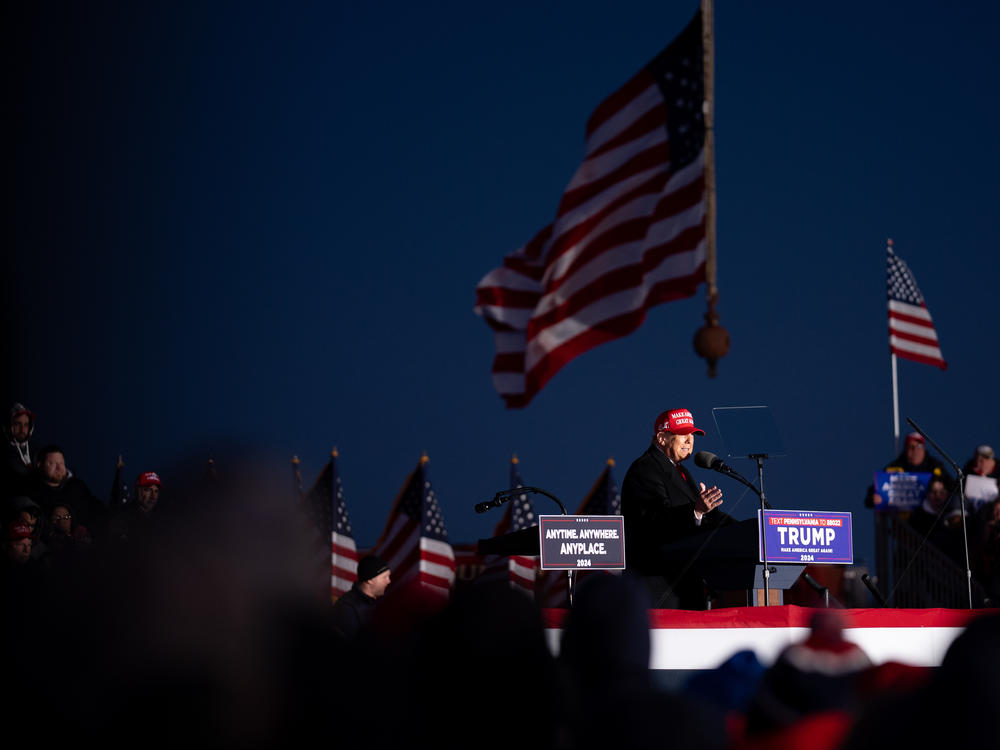Section Branding
Header Content
Trump's anti-abortion stance helped him win in 2016. Will it hurt him in 2024?
Primary Content
You're reading the Consider This newsletter, which unpacks one major news story each day. Subscribe here to get it delivered to your inbox, and listen to more from the Consider This podcast.
1. Trump wasn't always anti-abortion.
Trump will forever be known as the president who appointed the justices who helped overturn Roe v. Wade in June of 2022. But the former president hasn't always been against abortion rights. In 1999, when he was considering a run for the White House, Trump told NBC's Tim Russert on Meet the Press:
"I'm very pro-choice. I hate the concept of abortion. I hate it, I hate everything it stands for. I cringe when people debate the subject. But I still believe in choice."
By 2011, Trump had changed his position. Once again he was considering a run for president, and Trump described himself as "pro-life" when speaking to the Conservative Political Action Conference, or CPAC.
2. When he first ran for president, about half the country supported a legal right to abortion.
But a key group of voters overwhelmingly opposed it – white evangelical Christians. Trump needed their support, and he was successful: exit polling in the 2016 election showed nearly two-thirds of Christian voters chose Trump.
Their candidate delivered. Trump appointed three Supreme Court justices during his term– which ultimately led to the overturning of Roe v. Wade.
Some Republicans in Congress are pushing for a federal ban on abortion, with many in the Republican base pressuring Trump to voice his support. Last week, Trump posted a video on Truth Social that supported leaving abortion access up to the states:
"My view is that now that we have abortion where everybody wanted it from a legal standpoint. The states will determine by vote or legislation or perhaps both, and whatever they decide must be the law of the land, in this case the law of the state."
By saying he will instead leave the issue to the states - essentially the status quo - Trump appears to be trying to avoid strengthening Democrats' ability to rally their voters around abortion rights.
3. Now, an anti-abortion stance could be a political liability.
Every time there's been an abortion referendum since Dobbs, voters have favored abortion rights.
- In the almost two years since the Dobbs decision, more than a dozen states have banned most or all abortions. Those bans have meant that women have been turned away for emergency abortions in some states; and some people have been unable to access abortions in instances of rape.
- This is despite the fact that more than half of Americans still support Roe v. Wade.
- Voter backlash is apparent in several states where abortion has been on the ballot, with ballot casters signaling support for abortion rights - even in red states.
- Key Democratic voting blocs including women, younger voters, and nonwhite voters all list abortion as a major motivating issue.
Supporting a national abortion ban is a position that some Republicans like Chris Christie and Nikki Haley have said was unwise or at least impractical.
This election year, Trump's position on abortion could influence whether he wins or loses the race. But if he is elected, anti-abortion activists will likely push Trump to use the power of the executive branch to restrict abortion access.
For sponsor-free episodes of Consider This, sign up for Consider This+ via Apple Podcasts or at plus.npr.org. Email us at considerthis@npr.org.

